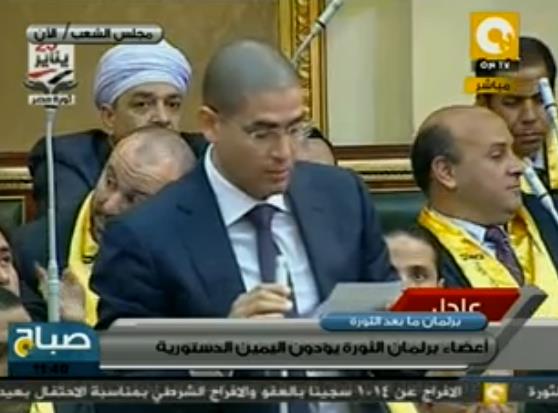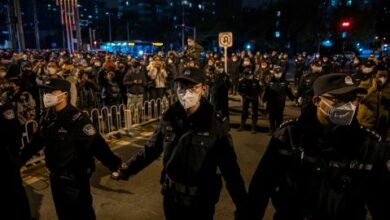
While facing scattered criticism for their performance in power, President Mohamed Morsy and the Muslim Brotherhood from which he hails have yet to face large-scale demonstrations, such as those planned for 24 August.
Calls for mass rallies appeared just one week after Morsy assumed power on 24 June, after securing slightly more than half the votes in the first free presidential election since the overthrow of former President Hosni Mubarak last year.
But the potential of the protests to mobilize demonstrators is hindered by conflicting demands from different groups and lack of coordination between the organizing parties. Some are pulling out after Morsy retired the oldest generals of the Supreme Council of the Armed Forces, a move that weakened the anti-Brotherhood camp, which had benefited from an apparent military-civilian rift.
The first call for the protests appeared on Facebook on 2 July and were made by 31-year-old computer engineer Ayman Yacoub, who named the page “The second revolution, 24 August, to dissolve the Muslim Brotherhood and the Freedom and Justice Party to restore the revolution.”
The description of the page, which has more than 15,000 members, reads: “We don’t attack persons or a religion, but we attack and shed light on a deceitful ideology that will lead to the fall of the state.”
The date was chosen because it marks the burning down of the Brotherhood’s offices back in the 1950s, says Yacoub, who nonetheless asserts that protests will be peaceful.
“We demand the dissolution of the FJP and the Brotherhood and the political isolation of their leaders because they are as corrupt as the former ruling National Democratic Party,” Yacoub told Egypt Independent.
Yacoub, who says he voted for Nasserist candidate Hamdeen Sabbahi in the presidential election, accuses the FJP and Morsy of winning the election through bribes.
“I don’t believe in the election results in both rounds, and it’s a possibility that the military council and the Brotherhood forged a deal and manipulated the results,” he says.
A delay in the announcement of the presidential runoff results between Morsy and Ahmed Shafiq, Mubarak’s last prime minister, cast doubt over the transparency of the process. Many had said the military supported Shafiq, and the issue was seen as another chapter of an ongoing Morsy-SCAF rift.
Yacoub, who participated in the 25 January revolution, says he is also against military rule.
“I chose Tahrir Square because this has always been the place from which we derive our legitimacy,” he says.
Besides the liberal Tagammu Party, known to be staunchly critical of the Brotherhood, several Coptic circles also welcomed the call for protests, even though none officially announced they would participate.
“We used to have two power centers, the SCAF and the Brotherhood, obstructing the instatement of a civilian state. We got rid of one and the other is still in place,” says Mina Magdy, founding member of the Maspero Youth Union, a Coptic activist group.
Magdy says his group still hasn’t decided whether to officially participate, but there is a general acceptance. He also called for Morsy to step down and for early elections to take place.
“The Brotherhood is a dictatorial and oppressive authority. Morsy has legitimate power from elections, but just as people gave him this power, they can take it back when he doesn’t respect the law and their freedoms,” he says.
Although Yacoub originally called for the protests, former MP Mohamed Abou Hamed has attracted media attention after replicating the call. He says protests should take place by the presidential palace and the Defense Ministry instead of in Tahrir.
Unlike Yacoub, Abou Hamed denies calling for Morsy’s overthrow, saying he thinks the election results are legitimate.
“The demands don’t include the fall of the elected president. On 25 January, we revolted against authoritarian rule of one dominant political party, but we discovered that there is still a certain regime trying to control power unilaterally. So the word ‘revolution’ refers to what we revolted against on 25 January,” Abou Hamed told Egypt Independent.
Abou Hamed, who ran on the liberal Free Egyptians Party ticket in the 2011 parliamentary elections, sided with the military in what seemed to be an open-ended divide between Morsy and the SCAF.
The former parliamentarian says he demands a Constituent Assembly that represents all citizens and respect for freedom of the press. He also wants an end to what some say is the Brotherhood’s exceptional status, saying the group should register to be a legal organization so that its activities and accounts can be monitored.
During the past week, a court upheld a prosecutor’s order to confiscate some issues of the privately owned Al-Dostour newspaper, which has been one of the sharpest critics of the Brotherhood. Furthermore, a Freedom and Justice Party lawyer filed a lawsuit against the editors-in-chief of three newspapers, accusing them of libel, insulting the president and spreading false information that jeopardized society’s peace.
This is in addition to the closure of privately owned satellite channel Al-Faraeen, whose host, Tawfiq Okasha, is being investigated over charges of inciting Morsy’s murder and supporting a military coup.
Abou Hamed also denounced Morsy’s decision to grant himself powers, including the right to issue and amend constitutional declarations without a referendum or consent from the current Constituent Assembly, or even consulting with political forces.
On 12 July, Morsy canceled the supplement to the Constitutional Declaration, which was passed by the SCAF on 17 June and limited the president’s powers. He replaced this with another decree that gives him executive and legislative powers, and authority to form a new constituent assembly if the current assembly’s work is impeded.
Abou Hamed says he is mobilizing for the protests by visiting governorates and talking with people.
“I guarantee you that the 12 million who voted for Ahmed Shafiq support what I am doing,” he says.
But he has not received wide support for his call, except from some Coptic groups and supporters of former intelligence chief Omar Suleiman.
Even Yacoub complains that Abou Hamed has hurt the protests’ image.
“Since Abou Hamed called for protests, many political parties and movements suspected the demonstrations of coming from remnants of the old regime,” Yacoub says.
Several public figures and political parties have distanced themselves from the calls to protest, including those who share the same grievances about the Brotherhood.
Former MP Mostafa Bakry, who once enjoyed good relations with former SCAF members and who has been leading anti-Brotherhood protests recently alongside Abou Hamed, is one of those figures.
“Abou Hamed didn’t consult with anyone before making the decision. I wished he met up with other political forces and figures and made a group decision. I am against this individuality,” Bakry told Egypt Independent.
Bakry says he supports the protests’ demands and called for an early presidential election after the new constitution is in place, adding that he and other public figures are forming a new political party to compete with the FJP.
The liberal Wafd Party, meanwhile, reversed its earlier decision to participate in the protests after party leader Al-Sayed al-Badawy called them anti-democratic. Badawy said that the people chose the president, and changes to this decision must come through the ballot box.
Sabbahi, who now leads the Popular Current movement, said recently that he would not join because it was a call for violence and to burn down the Brotherhood’s offices.
“I am against violence completely. All my life I have been detained, imprisoned and chased by security forces who tried to assassinate me, but I never called for the use of violence. Egypt is a country of law,” he said.
In response, Abou Hamed criticized those who he says backtracked on their words.
“People started withdrawing for two reasons: either out of fear from a Brotherhood crackdown or as a way to kiss ass to the new rulers. After the political parties’ shameful performance in representing liberals, I don’t depend on them anymore,” he says.
Abou Hamed also accuses Bakry of reneging on his pledge to participate after realizing the SCAF wouldn’t back him up after Morsy’s shakeup of military leadership.
Mina Magdy echoes a similar sentiment. “Of course the reshuffle of the SCAF’s members negatively affected the mobilization for the protests, because those who were planning to join to depose Morsy and reinstate the generals in power will no longer participate,” he says.
The Brotherhood, meanwhile, slammed the call for protests and says its members will protect their offices against possible attacks.
“The objective of this call is sedition and obstructing the Renaissance Project sponsored by the group," Mohamed Gamal Heshmat, member of the Brotherhood's Shura Council, told Al-Masry Al-Youm. "Advocates of these protests are nothing but fools. Those who call for a revolution against the Brotherhood must have an interest in harming the state’s sovereignty.”




